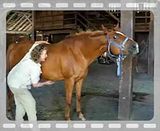|
|
Post by redhorse on Jul 30, 2008 15:12:25 GMT -5
This is Red - a healthy, happy guy.  He is due for a round of vaccinations - just got notice from my vet it is 5 way time. Last summer at this time he had 3 vaccinations at the same time - rabies, 5 way, and West Nile. Next day I found him standing alone in the pasture, covered with flies, covered with hives, unable to bend his neck and barely able to move. We hobbled back to the barn and I spent the next 5 hours soaking his warm hoofs in a mud puddle. The vet came out - same vet that said there would be no trouble giving him 3 vaccinations at the same time and gave him a banamine shot. Last May he had a West Nile and rabies. This time I checked on him in 2 hours. He was laying down in the pasture - got him up, he wanted to go back down and kept trying to go down the 1/4 mi. to the barn. Once there he had a fever and no gut sounds. He was colicing. Called vet (different one, same clinic). He said to give him banamine and hand graze - if things didn't start up in his gut to call and have him come out. Well, things did start up and Red was ok. Turns out about 8 horses had coliced from the batch of rabies vacinnes. I an extremely concerned about his next round of vaccines. Obviously I don't know specifically what he reacts to but would place the rabies at the top of the list. Any ideas will be very appreciated. |
|
|
|
Post by cutiepiepmu on Jul 30, 2008 15:34:00 GMT -5
DO NOT GIVE ALL AT ONCE. The 5 way can be broken down into individual shots - Give the flu/rhino first - wait a week - if all is well, move on to easter/western ince. Wait a week - if all is well - give rabies - if all is well - give w.nile. The reality is that more than likely it is one particular vaccination that is causing the issue.
ALSO - do not give in the neck. Give it in the hindquarters. This is a larger muscle and if it does react is less likely to cause breathing problems from injection site swelling.
Also - do'nt give vaccinations you don't need. If you don't need rabies - don't do it. If you are not in a boarding situation and don't travel - don't give Easter/Western Inc.
Also - rotate injection sites. If you give flue/rhino in the right butt cheek - give the next in the left, ect.
Also - have a dose of Epinephrine on hand to give for each vaccination as well as have benedryl on hand. 1 - 25mg per 100 pounds of body weight - If your kid does react - give a dose of banimane, Benedryl and a shot of Epi.(available anywhere vaccinations are sold or through the vet)
That is what I do if I have a sensitive horse. Split stuff up - even if the vet thinks you are a nut - it helps protect your kid. If you can give the vaccinations yourself it will save you farm calls as well.
Sara
|
|
|
|
Post by shelberttk2 on Jul 30, 2008 22:08:47 GMT -5
I definitely agree with cutie, definitely break the vaccines up. I usually do a 3-way, a Flu/Rhino and a Previnile. I always give a dose of bute or banamine before vaccinating my sensitive horses (In this case, a 1000lb dose of banamine is what I would use). I would also consider what type of exposure your horse has, if he isn't highly exposed and you are not hauling him around, is over 10 etc. I would keep it to a minimum....Like West Nile and Tetanus.
|
|
|
|
Post by pikzeedust on Jul 31, 2008 11:51:11 GMT -5
Break it up or give as many intra nasal vaccines as possible with bantamine. My mare had a horrible reaction one time and her hind legs were so swollen and she could hardly stand on them. She was extremely lathargic and had a fever for 3 days. The symptoms didn't come on until 3 days after the shots.
For the past 2 years in a row she had a lesser reaction however I don't know what it does to there muscles because a week after her vaccinations both years she twisted her ankle from being weak.
Only give them what they absolutely need!
|
|
|
|
Post by stormlady on Aug 1, 2008 12:09:33 GMT -5
Also, it helps (especially with tetanus) to exercise them for 15-30 minutes before and after giving the vaccines. It helps circulate the stuff around more quickly and result in less concentration around the injection site. If it does start to swell and stiffen up, ice the area. Keeping an eye on and treating the local area effects early may help prevent the larger systemic effects you are seeing. Also, I think the heat can increase the tendency towards and severity of a hives reaction. My friend's horse reacted with hives this year. It was quite hot that week. Try giving the vaccines on a cool day and if they do react with hives, cool hosing their body can help, too.
|
|